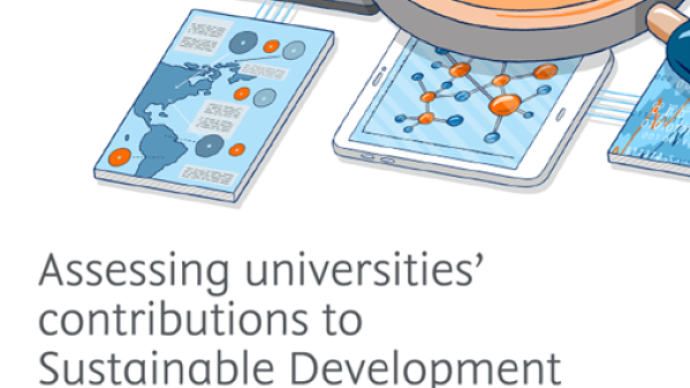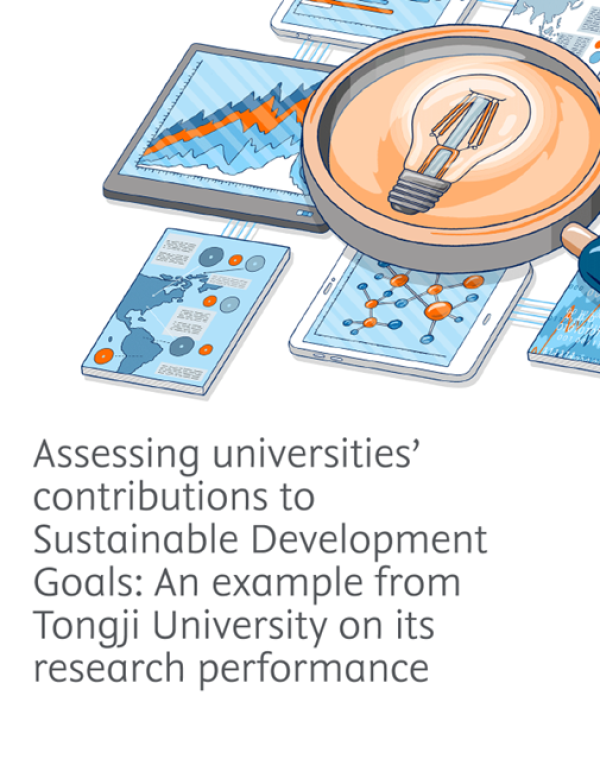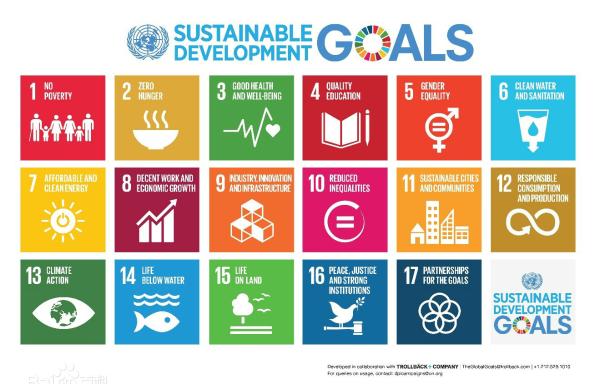
On May 20, 2022, Tongji University and Elsevier, a global information analysis agency, released the "Tongji University Sustainable Development Research and Innovation Report - Universities' Response to Sustainable Development Goals (SDGs) from a global perspective." Research Contributions" report. The report shows that Chinese universities are becoming a key force in achieving the Sustainable Development Goals.  May 20 is also the 115th anniversary of the founding of Tongji University and the 20th anniversary of the establishment of the UNEP-Tongji University School of Environment and Sustainable Development (IESD) jointly established by UNEP and Tongji University. The aforementioned report reviewed the achievements of Tongji University in cooperation with the United Nations Environment Programme over the past 20 years, and systematically summarized Tongji University’s contributions to sustainable development education, scientific research and social services. The report also proposed 115 future-oriented projects. The important frontier research topic of sustainable development calls on the whole society to make joint efforts to explore relevant issues in depth, and accelerate the process of promoting the sustainable development of a community with a shared future for all mankind.
May 20 is also the 115th anniversary of the founding of Tongji University and the 20th anniversary of the establishment of the UNEP-Tongji University School of Environment and Sustainable Development (IESD) jointly established by UNEP and Tongji University. The aforementioned report reviewed the achievements of Tongji University in cooperation with the United Nations Environment Programme over the past 20 years, and systematically summarized Tongji University’s contributions to sustainable development education, scientific research and social services. The report also proposed 115 future-oriented projects. The important frontier research topic of sustainable development calls on the whole society to make joint efforts to explore relevant issues in depth, and accelerate the process of promoting the sustainable development of a community with a shared future for all mankind.
At the press conference that day, Professor Wu Jiang, Dean of the UNEP-Tongji University School of Environment and Sustainable Development (IESD), gave a comprehensive interpretation of the SDG report. SDG was formally proposed at the United Nations Sustainable Development Summit on September 25, 2015. The 193 member states formally adopted 17 sustainable development goals at the summit, aiming to completely solve the development problems in the three dimensions of society, economy and environment in a comprehensive manner from 2015 to 2030, and turn to a sustainable development path.
This report focuses on the 17 sustainable development goals of the United Nations. Based on the quantitative data and analysis of scientific research literature in the past two decades, it is comprehensively displayed from multiple dimensions such as academic achievements, academic influence, research activity, international cooperation, and industry-university cooperation. The research achievements of Tongji University in the sustainable development goals are compared with the data of the world, the Asia-Pacific region and China. scientific research panorama.
According to Wu Jiang, in terms of academic achievements, in the past two decades, the total number of research outputs related to the SDGs in universities around the world has increased from 257,000 in 2002 to 1.26 million in 2021, quadrupling the total. The compound annual growth rate has reached 9%. The number and proportion of Tongji University's academic achievements in the field of sustainable development has grown rapidly, with a compound annual growth rate of research output reaching 24%. 38% in 2021.
In terms of academic influence, the normalized citation impact index of papers related to the SDGs of Tongji University has been comprehensively improved, and the proportion of highly cited papers published is significantly higher than the global level, reflecting Tongji University's academic achievements in the field of SDGs advantage and influence.
In addition, international research collaboration is critical to accelerating knowledge innovation and translation, and collaboration is also an important driver of academic impact. From 2002 to 2021, at the global level, 1/4 of SDG-related academic research will be completed by international cooperation. The proportion of international cooperation output of SDG research at Tongji University increased from 15% in 2002-2011 to 27% in 2012-2021, indicating that its level of international cooperation is also steadily increasing.
The report also shows that the relative activity index of scientific research output of Tongji University in SDG11 (sustainable cities and communities) and SDG6 (clean water and sanitation) is significantly higher than the global level. Based on its high research activity, Tongji University is one of the major contributors to global research on these two SDGs, and the related research output ranks third globally (SDG11) and ninth (SDG6) respectively.
As a pioneer in incorporating the SDGs into its own development strategy, Tongji University not only attracts attention for its research achievements on SDGs, but its research activities and cooperation projects also bring important practical value to the application of research results.
In 2002, the United Nations Environment Programme and Tongji University jointly established the School of Environment and Sustainable Development. Since its establishment 20 years ago, the School has devoted itself to issues related to sustainable development while cultivating a large number of professionals urgently needed by the global sustainable development cause. It has cooperated with the United Nations Environment Programme to publish the "Green Campus Handbook", "The Capital Airport Green Assessment Report", "Green Micro Action Handbook" (Chinese version), "Global Environment Outlook 6" (Asia-Pacific Youth Edition) "Shanghai Chongming Ecological Island International Assessment Report" and more than 30 reports and teaching materials with global influence, built a number of drinking water demonstration projects in North Africa and East Africa, benefiting more than 20 million people.
On April 28, 2022, Tongji University and the United Nations Environment Programme renewed a new round of cooperation memorandum. Tongji University will continue to work on South-South cooperation to further advance climate change, ecosystem management, environmental governance, chemicals and waste, and resources. High-level cooperation and exchanges in areas such as efficiency, in order to achieve the United Nations 2030 Sustainable Development Goals.
On the basis of summarizing the existing results, this report also released 115 important frontier research topics in the field of sustainable development, aiming to call on the whole society to jointly explore related issues and accelerate the process of promoting the sustainable development of a community with a shared future for all mankind.
It is understood that the 115 cutting-edge research topics are based on the analysis of scientific research publications and the conclusions of global experts. The topics widely cover various sustainable development goals of the United Nations, showing the research frontiers of the global academic community in the field of sustainable development. Among them, SDG3 (health and well-being), SDG7 (affordable and clean energy) and SDG9 (industry, innovation and infrastructure) three sustainable development goals have received the most attention from the global academic community.
These important frontier research topics include not only hot scientific research topics such as the mechanism and diagnosis and treatment methods of cancer and epidemic viruses, an integrated energy system that balances energy consumption and supply, the development of new materials and new processes, but also new trans- Subject research methods, academic entrepreneurship and other practical exploration topics. The report calls on universities and academic institutions around the world to focus on cutting-edge topics in sustainable development, join hands and take active actions to jointly develop the future, and continuously promote mankind to the sustainable development goals with high-quality scientific research and innovation.
At the press conference, Professor Lyu Peiming, Executive Vice President of Tongji University, said: "Since the 1990s, Tongji University has always insisted on playing the unique role of higher education institutions in global sustainable development. Through the United Nations Environment Programme-Tongji University The Institute of Environment and Sustainability (IESD), an international cooperation platform, brings together academic resources both inside and outside the school, and focuses on sustainable development to carry out long-term special research, and continuously produce high-level scientific research and high-end think tank results.”
It is understood that on April 23, 2021, proposed by Tongji University, Southeast University, Fudan University, East China Normal University, Nanjing University, Shanghai Jiaotong University and other "Eight East China Universities" jointly initiated and established the "Yangtze River Delta Sustainable Development University Alliance" (referred to as the "University Alliance") was established. The alliance will be committed to giving full play to the advantages of high-quality resources of universities in the Yangtze River Delta and serving the high-quality, integrated and sustainable development of the Yangtze River Delta.
 May 20 is also the 115th anniversary of the founding of Tongji University and the 20th anniversary of the establishment of the UNEP-Tongji University School of Environment and Sustainable Development (IESD) jointly established by UNEP and Tongji University. The aforementioned report reviewed the achievements of Tongji University in cooperation with the United Nations Environment Programme over the past 20 years, and systematically summarized Tongji University’s contributions to sustainable development education, scientific research and social services. The report also proposed 115 future-oriented projects. The important frontier research topic of sustainable development calls on the whole society to make joint efforts to explore relevant issues in depth, and accelerate the process of promoting the sustainable development of a community with a shared future for all mankind.
May 20 is also the 115th anniversary of the founding of Tongji University and the 20th anniversary of the establishment of the UNEP-Tongji University School of Environment and Sustainable Development (IESD) jointly established by UNEP and Tongji University. The aforementioned report reviewed the achievements of Tongji University in cooperation with the United Nations Environment Programme over the past 20 years, and systematically summarized Tongji University’s contributions to sustainable development education, scientific research and social services. The report also proposed 115 future-oriented projects. The important frontier research topic of sustainable development calls on the whole society to make joint efforts to explore relevant issues in depth, and accelerate the process of promoting the sustainable development of a community with a shared future for all mankind.At the press conference that day, Professor Wu Jiang, Dean of the UNEP-Tongji University School of Environment and Sustainable Development (IESD), gave a comprehensive interpretation of the SDG report. SDG was formally proposed at the United Nations Sustainable Development Summit on September 25, 2015. The 193 member states formally adopted 17 sustainable development goals at the summit, aiming to completely solve the development problems in the three dimensions of society, economy and environment in a comprehensive manner from 2015 to 2030, and turn to a sustainable development path.
This report focuses on the 17 sustainable development goals of the United Nations. Based on the quantitative data and analysis of scientific research literature in the past two decades, it is comprehensively displayed from multiple dimensions such as academic achievements, academic influence, research activity, international cooperation, and industry-university cooperation. The research achievements of Tongji University in the sustainable development goals are compared with the data of the world, the Asia-Pacific region and China. scientific research panorama.

According to Wu Jiang, in terms of academic achievements, in the past two decades, the total number of research outputs related to the SDGs in universities around the world has increased from 257,000 in 2002 to 1.26 million in 2021, quadrupling the total. The compound annual growth rate has reached 9%. The number and proportion of Tongji University's academic achievements in the field of sustainable development has grown rapidly, with a compound annual growth rate of research output reaching 24%. 38% in 2021.
In terms of academic influence, the normalized citation impact index of papers related to the SDGs of Tongji University has been comprehensively improved, and the proportion of highly cited papers published is significantly higher than the global level, reflecting Tongji University's academic achievements in the field of SDGs advantage and influence.
In addition, international research collaboration is critical to accelerating knowledge innovation and translation, and collaboration is also an important driver of academic impact. From 2002 to 2021, at the global level, 1/4 of SDG-related academic research will be completed by international cooperation. The proportion of international cooperation output of SDG research at Tongji University increased from 15% in 2002-2011 to 27% in 2012-2021, indicating that its level of international cooperation is also steadily increasing.
The report also shows that the relative activity index of scientific research output of Tongji University in SDG11 (sustainable cities and communities) and SDG6 (clean water and sanitation) is significantly higher than the global level. Based on its high research activity, Tongji University is one of the major contributors to global research on these two SDGs, and the related research output ranks third globally (SDG11) and ninth (SDG6) respectively.
As a pioneer in incorporating the SDGs into its own development strategy, Tongji University not only attracts attention for its research achievements on SDGs, but its research activities and cooperation projects also bring important practical value to the application of research results.
In 2002, the United Nations Environment Programme and Tongji University jointly established the School of Environment and Sustainable Development. Since its establishment 20 years ago, the School has devoted itself to issues related to sustainable development while cultivating a large number of professionals urgently needed by the global sustainable development cause. It has cooperated with the United Nations Environment Programme to publish the "Green Campus Handbook", "The Capital Airport Green Assessment Report", "Green Micro Action Handbook" (Chinese version), "Global Environment Outlook 6" (Asia-Pacific Youth Edition) "Shanghai Chongming Ecological Island International Assessment Report" and more than 30 reports and teaching materials with global influence, built a number of drinking water demonstration projects in North Africa and East Africa, benefiting more than 20 million people.
On April 28, 2022, Tongji University and the United Nations Environment Programme renewed a new round of cooperation memorandum. Tongji University will continue to work on South-South cooperation to further advance climate change, ecosystem management, environmental governance, chemicals and waste, and resources. High-level cooperation and exchanges in areas such as efficiency, in order to achieve the United Nations 2030 Sustainable Development Goals.
On the basis of summarizing the existing results, this report also released 115 important frontier research topics in the field of sustainable development, aiming to call on the whole society to jointly explore related issues and accelerate the process of promoting the sustainable development of a community with a shared future for all mankind.
It is understood that the 115 cutting-edge research topics are based on the analysis of scientific research publications and the conclusions of global experts. The topics widely cover various sustainable development goals of the United Nations, showing the research frontiers of the global academic community in the field of sustainable development. Among them, SDG3 (health and well-being), SDG7 (affordable and clean energy) and SDG9 (industry, innovation and infrastructure) three sustainable development goals have received the most attention from the global academic community.
These important frontier research topics include not only hot scientific research topics such as the mechanism and diagnosis and treatment methods of cancer and epidemic viruses, an integrated energy system that balances energy consumption and supply, the development of new materials and new processes, but also new trans- Subject research methods, academic entrepreneurship and other practical exploration topics. The report calls on universities and academic institutions around the world to focus on cutting-edge topics in sustainable development, join hands and take active actions to jointly develop the future, and continuously promote mankind to the sustainable development goals with high-quality scientific research and innovation.
At the press conference, Professor Lyu Peiming, Executive Vice President of Tongji University, said: "Since the 1990s, Tongji University has always insisted on playing the unique role of higher education institutions in global sustainable development. Through the United Nations Environment Programme-Tongji University The Institute of Environment and Sustainability (IESD), an international cooperation platform, brings together academic resources both inside and outside the school, and focuses on sustainable development to carry out long-term special research, and continuously produce high-level scientific research and high-end think tank results.”
It is understood that on April 23, 2021, proposed by Tongji University, Southeast University, Fudan University, East China Normal University, Nanjing University, Shanghai Jiaotong University and other "Eight East China Universities" jointly initiated and established the "Yangtze River Delta Sustainable Development University Alliance" (referred to as the "University Alliance") was established. The alliance will be committed to giving full play to the advantages of high-quality resources of universities in the Yangtze River Delta and serving the high-quality, integrated and sustainable development of the Yangtze River Delta.
Related Posts
0 Comments
Write A Comments